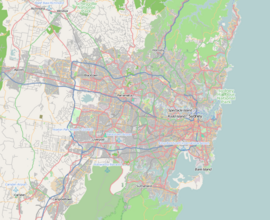St Mark's Church, Darling Point
| St Mark's Church | |
|---|---|
| St Mark's Church, Darling Point | |
 | |
Location in Greater Sydney | |
| 33°52′33″S 151°14′09″E / 33.8758°S 151.2357°E | |
| Location | Darling Point Road, Darling Point, Sydney, New South Wales |
| Country | Australia |
| Denomination | Anglican Church of Australia |
| Website | stmarksdp |
| History | |
| Status | Church |
| Founded | 1848 |
| Founder(s) | Thomas Sutcliffe Mort |
| Architecture | |
| Functional status | Active |
| Architect(s) | Edmund Blacket |
| Architectural type | Academic Gothic Revival |
| Completed | 1854; 1861; 1864 |
| Administration | |
| Diocese | Sydney |
| Clergy | |
| Rector | Michael Jensen |
| Laity | |
| Music group(s) | The St Mark's Society of Bellringers |
| Official name |
|
| Type | Built |
| Criteria | b., d. |
| Designated | 23 January 2006 |
St Mark's Church is an active Anglican church in Darling Point, a suburb of Sydney, New South Wales, Australia. It is part of a significant local heritage group that includes the church, rectory, and adjacent cottage. The group forms part of a large collection of important to late 19th century buildings of considerable townscape, historic and cultural significance, including the former St Mark's Crescent School, St Mark's Cottage and Bishopscourt, formerly Greenoaks.[1][2][3]
History
[edit]Constructed between 1848 and 1880, St Mark's Church was designed by Colonial Architect to New South Wales, Edmund Blacket, in an early Victorian Rustic Gothic Revival style with nave, chancel, vestries, organ chamber, tower and spire; made of Sydney sandstone with hardwood timber shingled roofs. The church was completed in 1854 with the spire, a gift from William Laidley, added later. In 1861 the church was extended to the west to include the porch and gallery. Prior to completion of this building, accommodation for worshippers in this section of the parish of Alexandria was provided by Thomas Ware Smart of Mona, who converted one of his cottages in Mona Lane in the Chapel of St Mark. In 1863 Wolliam Bradley of Lindesay built at his expense, the present vestries.[1]
St Mark's Church is one of the best known Anglican parish churches in Australia and has become a popular wedding venue hosting such famous weddings as Elton John's first marriage[4] and the fictional wedding in the film Muriel's Wedding. Social photographer Sam Hood captured many socialite weddings during the 1930s.[5]
Leadership
[edit]Established under the patronage of Bishop William Grant Broughton, the inaugural incumbent at St Marks' was the Reverend George Fairfowl Macarthur, who also served as the proprietor of St Mark's School which he conducted first at the rectory, then at Macquarie Fields and later at The Kings School, Parramatta.[1]
The current rector, since 2013, is the Reverend Michael Jensen,[6] a son of a former Archbishop of Sydney, the Most Reverend Peter Jensen.
See also
[edit]References
[edit]- ^ a b c "St Marks Anglican church". New South Wales Heritage Database. Office of Environment & Heritage. Retrieved 19 March 2018.
- ^ "Rectory of St Marks church". New South Wales Heritage Database. Office of Environment & Heritage. Retrieved 19 March 2018.
- ^ "St Marks Cottage - building, sandstone retaining walls". New South Wales Heritage Database. Office of Environment & Heritage. Retrieved 19 March 2018.
- ^ Rhiel, Mary; Suchoff, David Bruce (1996). The seductions of biography. Routledge. p. 23. ISBN 978-0-415-91090-3. Retrieved 2 February 2010.
- ^ "St. Mark's Church". Sydney Architecture. Retrieved 18 March 2018.
- ^ "Michael Jensen to leave Moore for St. Mark's Darling Point". Anglican Church League. 20 May 2013. Retrieved 18 March 2018.
Attribution
[edit]![]() This Wikipedia article was originally based on the St Marks Anglican church, the Rectory of St Marks church, and the St Marks Cottage - building, sandstone retaining walls, all listed on the "New South Wales State Heritage Register" published by the Government of New South Wales under CC-BY 3.0 AU licence (accessed on 19 March 2018).
This Wikipedia article was originally based on the St Marks Anglican church, the Rectory of St Marks church, and the St Marks Cottage - building, sandstone retaining walls, all listed on the "New South Wales State Heritage Register" published by the Government of New South Wales under CC-BY 3.0 AU licence (accessed on 19 March 2018).
- Anglican Diocese of Sydney
- New South Wales Heritage Database
- Churches completed in 1854
- Anglican church buildings in Sydney
- Edmund Blacket buildings in Sydney
- 1854 establishments in Australia
- Edmund Blacket church buildings
- Gothic Revival architecture in Sydney
- Elton John
- Darling Point, New South Wales
- Gothic Revival church buildings in Australia

